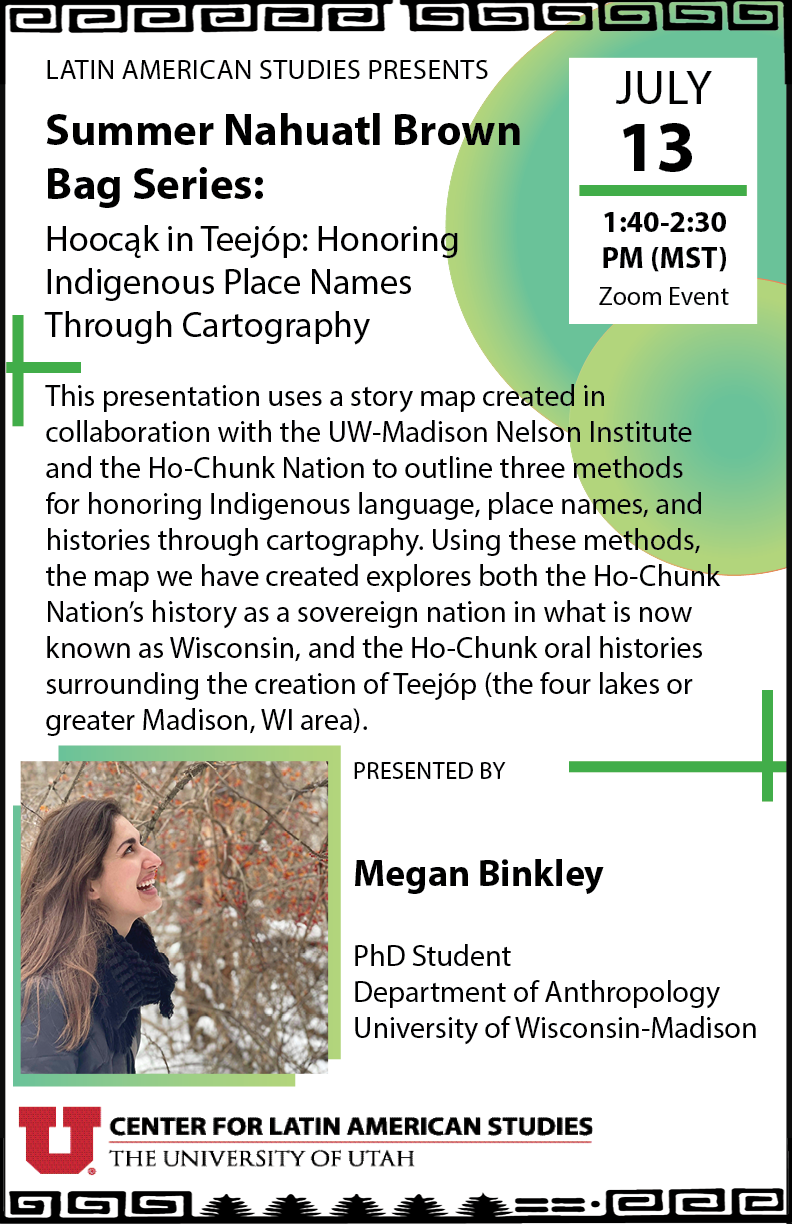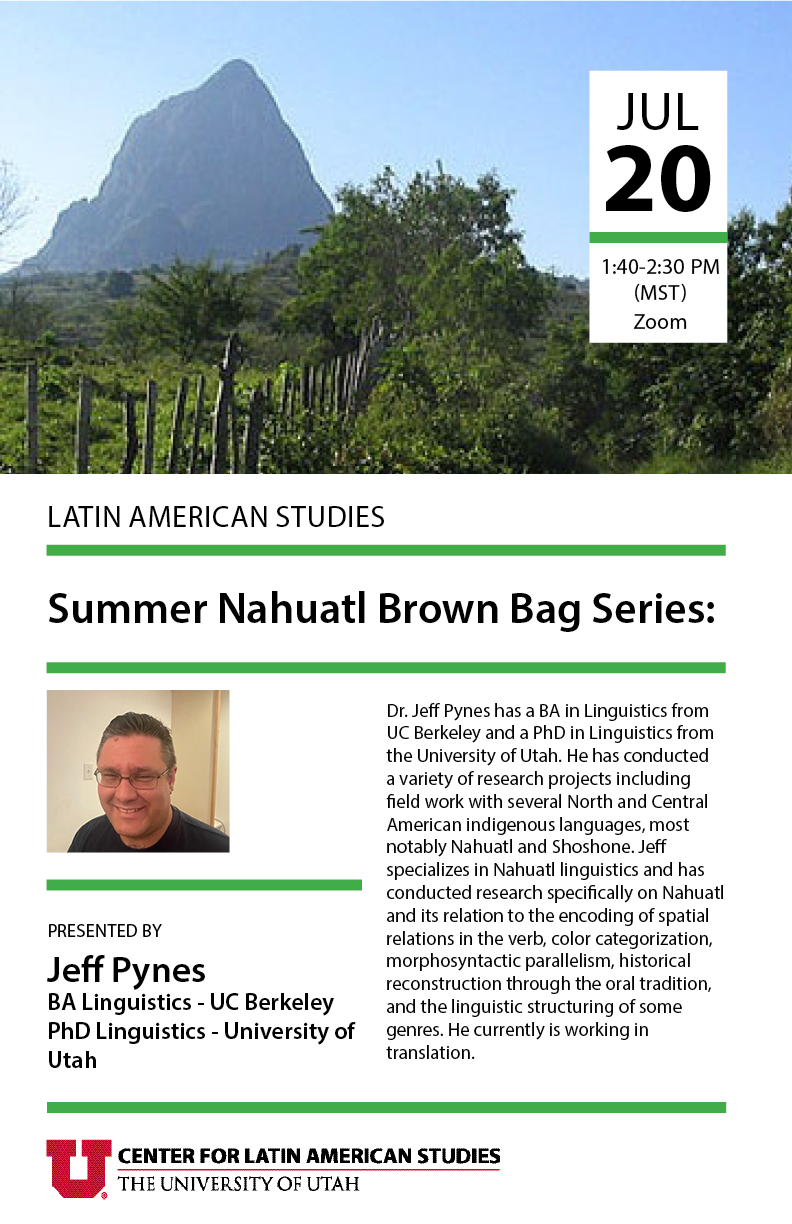2021 Summer Nahuatl Brown Bag Series
The Center for Latin American Studies (CLAS) at the University of Utah holds an annual Brown Bag Lecture series as part of itsSummer Nahuatl Language and Culture Intensive Program. In an effort to create a network of indigenous studies scholars, CLAS organizes weekly Brown Bag Talks with a variety of speakers ranging from the program’s Nahuatl program instructors, U of U faculty, external academics, as well as participating students.
 Hoocąk in Teejóp: Honoring Indigenous Place Names Through Cartography
Hoocąk in Teejóp: Honoring Indigenous Place Names Through Cartography
This presentation uses a story map created in collaboration with the UW-Madison Nelson Institute and the Ho-Chunk Nation to outline three methods for honoring Indigenous language, place names, and histories through cartography. Using these methods, the map we have created explores both the Ho-Chunk Nation’s history as a sovereign nation in what is now known as Wisconsin, and the Ho-Chunk oral histories surrounding the creation of Teejóp (the four lakes or greater Madison, WI area).
Megan Binkley is a graduate student in the Archaeology PhD program at the University of Wisconsin-Madison, under the supervision of Dr. Sarah Clayton and Dr. J. Mark Kenoyer. Megan’s research interests include Mesoamerican archaeology during the Classic Period (AD 250-AD 900), archaeological cartography, ethnoarchaeology, and developing archaeometric methods for accessing perishable craft industries in societies lacking ethnohistoric records. Megan is currently collaborating with the Ho-Chunk Nation, the UW-Madison Nelson Institute, and the UW-Madison Biotechnology Lab to map ancient Ho-Chunk travel routes and develop chemical analysis methods for detecting dye and colorant residues in archaeological ceramics.
 Culture Expressed Through Language: Three Vignettes from Studying Nahuatl
Culture Expressed Through Language: Three Vignettes from Studying Nahuatl
Dr. Jeff Pynes has a BA in Linguistics from UC Berkeley and a PhD in Linguistics from the University of Utah. He has conducted a variety of research projects including field work with several North and Central American indigenous languages, most notably Nahuatl and Shoshone. Jeff specializes in Nahuatl linguistics and has conducted research specifically on Nahuatl and its relation to the encoding of spatial relations in the verb, color categorization, morphosyntactic parallelism, historical reconstruction through the oral tradition, and the linguistic structuring of some genres. He currently is working in translation.
 “From the Codex Saville to the Tira of don Martín: Reevaluating a Nahua Pictorial
History”
“From the Codex Saville to the Tira of don Martín: Reevaluating a Nahua Pictorial
History”
Written in phases by a series of tlahcuilohqueh (painters), this Nahua document recorded a chronology from 1402 to 1545, detailing migration, altepetl (polity) foundation, and successive rulers through the arrival of Europeans on horseback, the fall of Tenochtitlan in 1521, and the foundation of a local Christian church. Little studied since the 1920s when it entered the collections of the Museum of the American Indian/Heye Foundation, it has been known for a century as the Codex Saville, after the collector who acquired it. At the conquest’s quincentenary, a new touchstone analysis of this document integrates diagnostic imaging, scientific and ethnohistorical analyses, and provenance research with a renewed focus on the Nahuatl pictographic and alphabetic texts. A transcription and English translation of the alphabetic text clarifies that this document also records the words of a man known as don Martín dictating the distribution of his wealth to his descendants. Rather than a rupture driven by the European invasion, this Tira of don Martín instead emphasizes specific, local continuity.
Presenter:
Alanna S. Radlo-Dzur is an art historian of Indigenous arts in the Americas, specializing in post-classic and early colonial Nahua communities of central Mexico. She is a research specialist at the Getty Research Institute and a doctoral candidate in the Department of the History of Art at Ohio State University.
 Summer Nahuatl Brown Bag Series: Closing Event
Summer Nahuatl Brown Bag Series: Closing Event
Join us on August 6th for our last Summer 2021 Nahuatl Brown Bag event. This event will be presented by Mtra. Irma Xóchitl Cuauhtémoc Xicoténcatl, Originaria de Cuauhtlancingo, Puebla, presenting on Persistencia de topónimos y antropónimos and Martín Tonalmeyotl, Originario de la Chilapa Guerrero, presenting on Poesía contemporánea en lengua náhuatl.
The Center for Latin American Studies (CLAS) at the University of Utah holds an annual Brown Bag Lecture series as part of itsSummer Nahuatl Language and Culture Intensive Program. In an effort to create a network of indigenous studies scholars, CLAS organizes weekly Brown Bag Talks with a variety of speakers ranging from the program’s Nahuatl program instructors, U of U faculty, external academics, as well as participating students.
